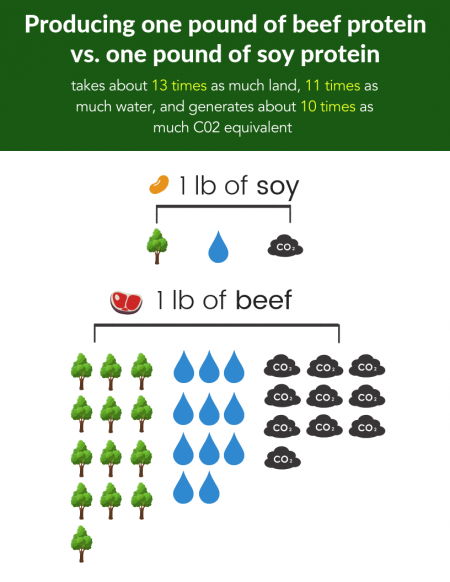A significant intersection between food and fighting climate change is the decision to eat less meat. The livestock sector is very resource-intensive and contributes greatly to greenhouse gas emissions. Meaningful advancements in the agricultural industry have allowed large-scale farms to become much more efficient. However, a growing number of people are becoming motivated to switch out meat for plants, whether it be for environmental, nutritional or ethical reasons. Pursuing a more plant-based diet can help slow land degradation, save water, and reduce greenhouse gas emissions by curbing the growth of the livestock sector. As a bonus, many plant-based proteins have a nutritional edge over meat, typically containing less saturated fats and more nutrients than animal protein.
Land
Unlike plants, who only require sun and water to grow, animals need processed feed. Most animal feed is corn or grain based. The resources required to produce these plants for feed is factored into a livestock’s environmental footprint. Producing red meat products typically incurs more negative environmental impacts because red meat is sourced from larger animals, who consume more feed.
Simply growing the materials needed to feed livestock requires large swaths of land. Combined with the necessary grazing area for animals, massive portions of our land are altered to meet the demands of our meat-based diets. More than ¼ of our planet’s livable land area is used for animal grazing, (FAO, 2006). Plant-based diets require land altercation as well, but on a smaller and less destructive scale.
Water
A staggering 85 percent of all U.S. consumptive water use is dedicated to irrigated agriculture (USDA, 2018) and a large portion of that agriculture exists with the sole purpose of growing food for livestock. The total amount of grain consumed by livestock in the United States was found to be seven times greater than the amount of grains eaten directly by American people (Pimentel, 2003). In Ontario, more than half of the province’s grain production is domestically used for animal feed. (Grain Farmers of ON, 2018). Growing feed for livestock places heavy demands on our freshwater supply, and livestock itself adds overwhelming levels of nutrients through animal waste to nearby waterways, contributing to biodiversity loss in marine ecosystems.
Plant-Based Alternatives
Farmers raising the same type of livestock can have two very different sized environmental footprints, largely influenced by the type of technology they use. Low-impact farming processes can more than halve the resources and emissions associated with meat production (Milius, 2018). However, choosing meat products only sourced from farms using low-impact processes still results in a larger environmental footprint than a plant-based diet.
From a nutritional perspective, plant-based sources of protein such as legumes, pulses, and seeds, are able to provide nearly equivalent amounts of protein as meat sources, but with only a fraction of the environmental impact (Hunnes, 2016). Plus, plant-sources are packed with other healthful nutrients including fiber, vitamins, and minerals.
The decision to trade in meat for more plants is kind to your wallet and the environment. Plant-based protein is often cheaper than animal protein. Start slow with your transition and focus on the nutritional content of your tradeoffs. Begin by trying to go one day a week without meat. For many, meat is central to their favorite dishes. Tasty and delicious recipes make transitioning to a less meat-centered diet a lot easier. Small conscious decisions about your diet’s environmental impact add up.

Bibliography
FAO. (2006). Livestock’s Long Shadow. Retrieved from http://www.fao.org/docrep/010/a0701e/a0701e.pdf
Grain Farmers of ON. (2018). Market Utilization. Retrieved from https://gfo.ca/market-development/market-utilization/
Hunnes, D. (2016). The Case for Plant Based. Retrieved from https://www.sustain.ucla.edu/our-initiatives/food-systems/the-case-for-plant-based/
McNally, J. (2011, August 31). Can Vegetarianism Save the World? Nitty-gritty. Retrieved November 13, 2018, from https://stanfordmag.org/contents/can-vegetarianism-save-the-world-nitty-gritty
Milius, S. (2018, June 29). A big analysis of environmental data strengthens the case for plant-based diets. Retrieved from https://www.sciencenews.org/article/plant-based-diets-greenhouse-gases-environment
Pimentel, D. (2003, September 01). Sustainability of meat-based and plant-based diets and the environment. Retrieved from https://doi.org/10.1093/ajcn/78.3.660S
USDA. (2018). Irrigation & Water Use. Retrieved from https://www.ers.usda.gov/topics/farm-practices-management/irrigation-water-use/
Wednesday, November 14, 2018 in General
Share: Twitter, Facebook



